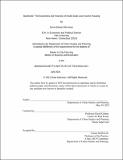Slumlords? The Economics and Finances of Small-Scale Low-Income Housing
Author(s)
Morrison, Drew Edward
DownloadThesis PDF (1.989Mb)
Advisor
Geltner, David
Terms of use
Metadata
Show full item recordAbstract
The American urban poor suffer from our collective policy failure to guarantee all citizens access to a quality home. Low-quality housing has implications for neighborhood stability, adult and child health, and quality of life for those who live there. America’s history of racial segregation means that this low-quality housing has affected low-income, communities of color generationally. And yet, though 95 percent of low-income Americans live in private housing, the private low-income rental market is relatively understudied. The 1-4-unit market, which represents nearly half of all housing units for the urban poor, is particularly overlooked in both the academic literature and in policymaking. This paper seeks to improve our collective understanding of this market by bringing together existing economic and sociological theories of how the private, small-scale low-income rental housing market operates into a cohesive economic and financial framework.
To understand the market, I consider the economic and behavioral incentives of landlords and property investors. I differentiate the operational behaviors of specific types of landlords, evaluate the property and portfolio-level economics of small buildings in the low-income market, and consider the incentives created by the limited nature of financing in this market. Altogether, these economic and financial incentives and behaviors generate a market that is actively aligned toward degrading property conditions in favor of landlord and investor profit. This paper builds on the existing academic literature through discounted cash flow analyses that model the economic considerations of low-income landlords and through GIS mapping of the presence of large-scale landlord operations in communities in New Haven, CT.
Having articulated the frameworks for understanding the market, I consider how the current COVID-19 crisis has exacerbated issues of quality and financial sustainability. I then identify a three-pronged approach for addressing housing quality and the broader market failures in the low-income market through (a) renewed approaches to code enforcement, (b) innovative landlord approaches that would bring better actors into the market, and (c) broad policy reform to improve housing for low-income Americans. I conclude with an evaluation of how housing quality policy can tie into current trends around inequality, infrastructure investment, and postCOVID recovery.
Date issued
2021-06Department
Massachusetts Institute of Technology. Department of Urban Studies and PlanningPublisher
Massachusetts Institute of Technology